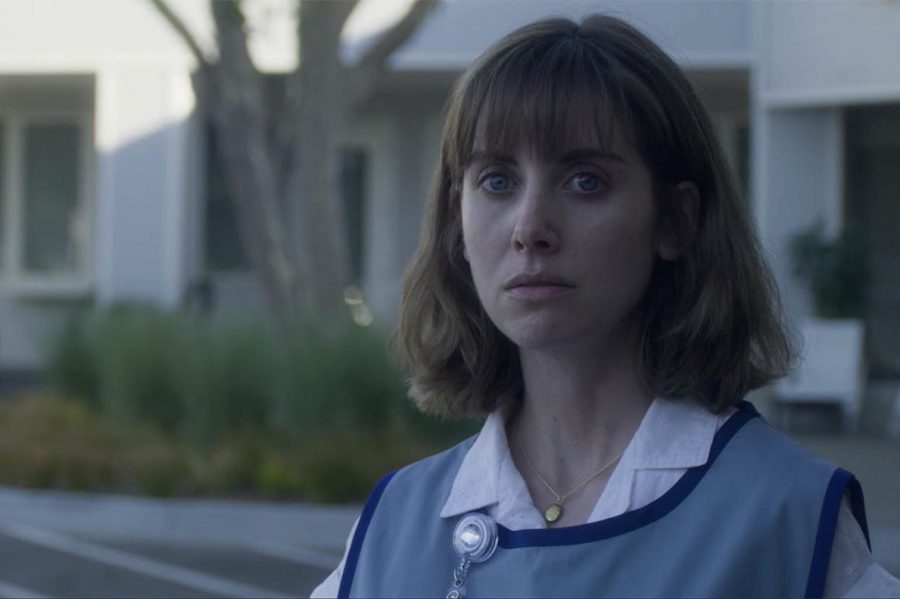‘Horse Girl’ Fuels the Imagination with Whimsy and Nightmares
Alison Brie appears in Horse Girl by Jeff Baena, an official selection of the Premieres program at the 2020 Sundance Film Festival. Courtesy of Sundance Institute.
February 1, 2020
Some of the greatest mind-bending films ask us questions about how to differentiate between the real and the unreal, from “Inception” to “The Truman Show” to “The Matrix.” How often, however, do we face such dilemmas in real life? For many people suffering from mental illness, it can be especially difficult to distinguish between imagination and the real world. Netflix’s upcoming movie “Horse Girl” tackles this issue as it narrates the story of a conspiracy theorist who might either be a paranoid schizophrenic or a literal clone trapped in an infinite time loop.
Sarah (Alison Brie) is an awkward young woman trying to reconcile her own odd habits, bizarre interests and obsessive traits while dating and making friends her own age. The character is simply pitiable at first, trying but failing to converse with strangers and reconcile with personal loss, instead wasting away her time with supernatural soap operas and Zumba. As she continuously suffers from displacement through sleepwalking, frightening dreams and forgetfulness, Sarah grows to believe that aliens are responsible of her pain. She takes it upon herself to investigate, and, as such, tunnels down the depths of her outwardly ordinary, if not dull-seeming, persona.
The entirety of “Horse Girl” feels unnerving and invasive. It makes use of multiple slow-zooming shots, which give it a claustrophobic and synthetic aura. The color palette of the film plays out in nauseous pastels, giving it a playful look even in the moments where the plot turns most sinister. Like its main character, “Horse Girl” is underscored by aggressive friendliness and dreaminess lined with true menace.
Director Jeff Baena co-wrote the screenplay for “Horse Girl” with Brie, who told him that she wanted to create a film reflecting her grandmother’s experiences with paranoid schizophrenia. However, “Horse Girl” doesn’t explore this disability from an outsider’s perspective of seeing somebody else’s mind deteriorate. Instead, the film explores Sarah’s convictions as though they were plausibly real. While the viewer can sit back and consciously understand that aliens and cloning don’t exist, “Horse Girl” works hard to make you picture that they might, and Sarah’s fears about these plots being real will certainly consume you. The final product that “Horse Girl” is perhaps nothing short of a genuine horror movie.
Although Sarah’s behaviors begin to frighten and threaten those in her inner circle, one can’t help but to feel that her actions make sense if her beliefs are reality. It’s our tendency to label people who struggle with mental illnesses and disorders as “crazy” for acting out in dangerous ways that go against the social grain. “Horse Girl” challenges this notion by showing us that if Sarah is right — if everything she was imagining was real — that her responses are about as logical or sane as the choices that anybody would make. If we were to suddenly believe that our lives were being manipulated by extraterrestrials, “Horse Girl” seems to argue, we’d behave no differently from Sarah, who is broadly shunned and condemned by those around her for her mental illness. Such a proposition is frightening, and forces us to examine our own cruelty toward those who perceive reality and think differently from our mainstream neurotypical populace. Such a message is easily the best quality of the film taken at its whole.
However, “Horse Girl” sadly isn’t without its weaknesses. While the movie brings a lot to the table with its cerebral outlook and intellectual content, it underserves in providing the audience points for clear emotional attachment and sympathy. This has nothing to do with Brie’s acting — her performance is one of the most impressive I’ve seen from an actress in recent memory. Her tics, gestures and manner of speech certainly feel grounded. However, the script tries to be too clever or disturbing in parts where it perhaps should have aimed for the heart. Sarah’s hallucinations and dreams are incredibly frightening, filled with a number of scares that are bound to make you tense up in your seat.
On this point, feeling sorry for Sarah is easy, since whether or not her convictions are real, they’re certainly hellish. Nonetheless, the film makes it difficult at times to feel with Sarah. While the film’s story teases the audience with promises to open itself up and illustrating Sarah’s personal losses in rawer emotive detail, the doors of “Horse Girl” remain firmly shut in places where they hadn’t needed to. So while “Horse Girl” makes for an incredibly interesting character study and nightmare factory, it hardly makes for a film that one can feel internally connected with. The result is something of a porcelain doll. While “Horse Girl” is undeniably beautiful and well-crafted on the outside, it feels hollow internally. It’s impossible to say that this film will leave you with a sensation of satisfaction rather than wanting. Still, I’d recommend it to those who are looking to see a film that explores science fiction and horror with concepts and stylization that feel new and boundary-breaking.
Overall, I’d rate “Horse Girl” a total of 7 out of 10 stars. While I can’t say that I enjoyed it, it did force me to think and, visually, the movie is highly well made.












